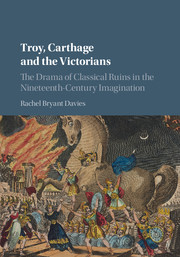 Troy, Carthage and the Victorians
Troy, Carthage and the Victorians Book contents
- Frontmatter
- Contents
- List of Plates
- List of Figures
- Acknowledgements
- Prologue
- 1 Introduction: The Ruins of Troy and Carthage ‘Still Flaming to the Imagination’ in the Nineteenth Century
- 2 ‘An Imaginary Troy’: Homeric Pilgrimage, Topography and Archaeology
- 3 ‘Not Classic, but Quite Correct’: The Trojan War at the Circus
- 4 Freely Perverted from Classic Texts’: The Iliad and Aeneid Burlesqued
- 5 ‘Sitting Among the Bricks of Covent Garden’: Carthage and the Future Ruins of the Nineteenth Century
- Epilogue: Troy and Carthage as ‘A Beacon and a Warning’
- Appendix A List of Burlesques
- Appendix B Select Chronology
- References
- Index
3 - ‘Not Classic, but Quite Correct’: The Trojan War at the Circus
Published online by Cambridge University Press: 03 March 2018
- Frontmatter
- Contents
- List of Plates
- List of Figures
- Acknowledgements
- Prologue
- 1 Introduction: The Ruins of Troy and Carthage ‘Still Flaming to the Imagination’ in the Nineteenth Century
- 2 ‘An Imaginary Troy’: Homeric Pilgrimage, Topography and Archaeology
- 3 ‘Not Classic, but Quite Correct’: The Trojan War at the Circus
- 4 Freely Perverted from Classic Texts’: The Iliad and Aeneid Burlesqued
- 5 ‘Sitting Among the Bricks of Covent Garden’: Carthage and the Future Ruins of the Nineteenth Century
- Epilogue: Troy and Carthage as ‘A Beacon and a Warning’
- Appendix A List of Burlesques
- Appendix B Select Chronology
- References
- Index
Summary
Astley's Royal Amphitheatre. – Lessee and Manager, Mr. William Cooke.
The new Mythological Equestrian Burlesque, which has met with the most unequivocal success, will be acted every Evening. The tout ensemble of this classical production – the battles of the ancients, the war chariots, drawn by fleet coursers and the perfect semblance of reality of the equestrian display – are greeted with cheering and flattering approbation. The miraculous soubresault of Her Christoff, on the Tight Rope, is the theme of general conversation. Any description of this wonderful performance would appear fabulous. At this Amphitheatre is to be seen the Smallest Horse in the known world.
On Monday, September 4th, and all the week, an Historical, Lyrical, Mythological, Equestrian Burlesque, by Hugo Vamp, Esq., called THE SIEGE OF TROY; or, The Giant Horse and the Miss-Judgment of Paris. After which, the inoui performance of Her Christoff, who is engaged but for a limited period. Mr. William Cooke, with his matchless and incomparable Stud, in the SCENES OF THE CIRCLE, directed solely by him. To conclude with Mr. S.G. Healey's Equestrian Ballet, THE KNIGHT AND THE WATER LILY; or, Love among the Mermaids. Stage Manager, Mr. W. West. Acting Manager, Mr. Campbell. Equestrian Director, Mr. W. Cooke, jun.
Advertisement in The Era, 3 September 1854,.Within the space of twenty years, Astley's Amphitheatre, a circus-cumtheatre on Westminster Bridge Road, Lambeth, staged at least three runs of two ‘equestrian burlesques’ based on the Trojan mythic cycle: in 1833, The Giant Horse; or, The Siege of Troy, which had an astounding 100 performances (the entire season) and was revived in 1840 as The Siege of Troy; or, The Great Horse of Greece; and in 1854, The Siege of Troy; or, The Giant Horse and Miss-Judgment of Paris, described in the newspaper advertisement above. As this notice emphasises, these hugely popular shows combined circus feats with spectacular scenery, stage effects and the sort of comic dramas parodying classical mythology which dominated nineteenth-century popular entertainment. Such spectacles might sound like a bizarre aberration in theatrical annals but, as contemporary reviews show, this variety was much appreciated and the horseback melodramas, or ‘hippodramas’, were one very popular response to the monopoly on spoken drama of the two ‘legitimate’ Theatres Royal at Covent Garden and Drury Lane, which lasted until the Theatre Regulation Act of 1843.
- Type
- Chapter
- Information
- Troy, Carthage and the VictoriansThe Drama of Classical Ruins in the Nineteenth-Century Imagination, pp. 125 - 202Publisher: Cambridge University PressPrint publication year: 2018
